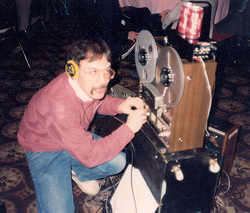
June 5, 2011
by Bob Burnham
WHO AM I TO THE “OTR” WORLD?
I’m the guy for the last several years who has sat behind tables of thousands of audio CDs and a few other products. I have been a “regular” for many years at both the Cincinnati and Friends of Old Time Radio conventions in Newark.
I’m the one who developed the audio product from the ground-up. I’m not an mp3 peddler, content to be salesman. I’m an audio engineer, too.
Clean up, creation and production of those products requires a lot of technology. Fortunately, that’s my business, too, but it does not come without some cost.
HOW IT STARTED & PROGRESSED
I began the business long ago with little more than a Smith Corona typewriter and a bunch of tape decks. Eventually, better quality tape decks and typewriters were acquired.
Then we computerized much of the operation in the 1980s.
Dot-matrix printers and eventually Laser Writers were used for such things as cassette labels and catalog layouts. Hand-typing labels of any kind became a thing of the past and the old-time radio world readily supported this advancement.
OUT WITH THE OLD IN WITH THE NEW
However, the end of the 1990s phased out, the audio cassette product, replaced by audio CDs. This was a change we had to “force” upon many loyal supporters who already had very large accumulations of analog tapes. We all managed to survive.
On the plus side, that product has also evolved as the technology to clean-up and “master” audio evolved and became more affordable.
LOOKING BACK
Thirty-five years is a long time to be doing anything, but during that time, a few things never changed: That we would support any entity or person who supported us, that we would have uncompromising attention to detail with regard to sound quality, and that we’d deliver the best service we were able to at reasonable prices.
There are a lot of “methods” to my madness – and madness IT CERTAINLY IS having operated the “old-time” division in the “red” for the last couple years.
Yet we have many friends, and the “enemies” if there ever really were any – have faded away. By nature, I’m a survivor and we never REALLY stopped. We took a couple years “off” to work on the newer product plus nurture a “professional services” business.
HOW IT’S DONE
To make the catalog marketing work today (now essentially as a one-man-operation), we use several mostly custom-built networked computers. Along with those workstations are two HP printers, four network-attached storage boxes, plus specialized “nostalgia” audio equipment (to retrieve the content of original masters). Such old-school equipment includes Otari and Tascam reel to reel and cassette decks. We have no “consumer-grade” equipment in service at this time.
The computer software has also evolved and I have to know enough about everything to be fairly dangerous, but fairly efficient at the same time. Once in a great while, there are equipment failures. We don’t generally use repair centers, as that is also one of my specialties.
A variety of methods have been used to help pay the bills. Of recent years, the most “profitable” (if you could call it that) of which has been the two conventions we attend every year.
One of those conventions will cease to exist after this year.
What this will mean to my operation is unknown at this time.
I intend to continue to issue periodic supplements hopefully on a quarterly basis. These are primarily recent additions to the digital library. Occasionally, there are still new shows found and brought into circulation.
A LOOK TOWARD TOMORROW
With a look toward the future, all shows are mastered at a higher quality grade than that of a standard CD. If there is some variation of “SUPER MP3” that catches on, our archive will already be ready for it.
My audio work will eventually all be downloadable at minimal cost. Anyone who has already posted any of my work without my permission will eventually fade away as well.
I have a lot more to accomplish as one of “sources” to the digital world of original material. The fact is it’s available right now in a couple different popular digital formats, but wait! There’s more: Those who have supported my work over the past couple decades will have free access to the downloadable archive library… as mentioned, I am a “survivor,”. but it’s going to be A WHILE!
----Bob Burnham
----06-05-2011
